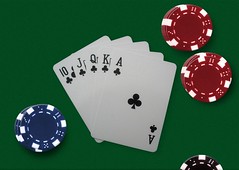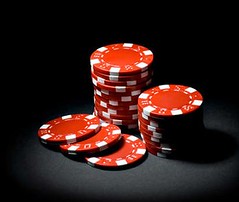 Omaha and holdem poker rules playing principles comparison. The 2nd Part
Omaha and holdem poker rules playing principles comparison. The 2nd Part
This post is the contuinuation of Omaha Poker and Holdem Poker Rules Comparison.
4) In Omaha holdem poker rules any hand can be presented as a more probable
In holdem if there is a pair on the board a bet is made on a three-of-a-kind; with a possible straight one can make bets on two pairs. When playing a four-card combination there are good chances that someone has the top hand that the board allows. If, say, there are three hearts on the board, then someone may have a flush. If there are two sixes – someone may have a full. If you make a bet, your opponent will call it and not on the assumption of bluffing, if only you don’t have such a reputation. If they don’t look at it, they presumably believe you when you bet. Even if someone managed to read (with some probability) your hand, there is a possibility anyway that you got two unknown cards, that you were lucky and you managed to draw a guttshot straight or even a flush on the last card.
5) The positional game also differs.
In a pot-limit Omaha more players stay for the flop than in a pot-limit holdem. There is so much money in the pot that it is unlikely that someone will bet and take the pot in any moment of the dealing. (On the same reason it will be good for Omaha players to bet in upper limit during the flop and not only on the fourth and fifth streets as it would normally be in holdem). In theory the position can be used in two different ways: to win the pot and to win (or save) the bet. Naturally the first variant is preferable. However, in Omaha one wins the pot at the showdown very rare with anything but the monster hand. So we may conclude that in Omaha rules a position is not so important as in a limited holdem poker.
Limits in Omaha holdem poker rules
 Omaha poker is also played in pot-limit rules and in no limit. When it first appeared the game was played with no limits. The players, however, soon understood that a pot-limit game is better than any other form because of the nuts, appearing quite often, and taking the delight of the pot away, and making the game more complicated by someone’s giant bet. In our book we will describe only the pot-limit form and will skip the unlimited form. Pot-limit Omaha holdem poker rules differ a lot from rules for a limited Omaha. When playing pot limit-Omaha you can’t knock your opponents out of the pot not using fusion energy, because they pay for their hands too good price (or so they think). In a pot-limit game you need a lot stronger hand to call a bet. If a bet is equal to the pot, you get only 2 to 1 for your hand.
Omaha poker is also played in pot-limit rules and in no limit. When it first appeared the game was played with no limits. The players, however, soon understood that a pot-limit game is better than any other form because of the nuts, appearing quite often, and taking the delight of the pot away, and making the game more complicated by someone’s giant bet. In our book we will describe only the pot-limit form and will skip the unlimited form. Pot-limit Omaha holdem poker rules differ a lot from rules for a limited Omaha. When playing pot limit-Omaha you can’t knock your opponents out of the pot not using fusion energy, because they pay for their hands too good price (or so they think). In a pot-limit game you need a lot stronger hand to call a bet. If a bet is equal to the pot, you get only 2 to 1 for your hand.
6) Strong (reliable) players are less exposed to pressure.
The pleasant side of Omaha is that people, who prefer hands with high probability to win, can’t be pressed by those who play many starting hands only because small cards appear on the board. When playing holdem, serious players are sometimes being “kicked” during the streets, if there are small cards on the board like 7-6-5 or 6-6-2, especially if he hinted on higher cards in preflop. In Omaha a reliable and wise player will play and often even rise with his hands like 10-10-9-8, 9-8-7-6, Q-Q-6-6 and so on. This means that there is no need of kicking him just because he showed his strength before the flop or because it is known that you play only high quality starting hands. In Omaha regardless of a street type or a flop this kicker can’t be sure that you don’t have nuts because you are too good a player to have those cards.
